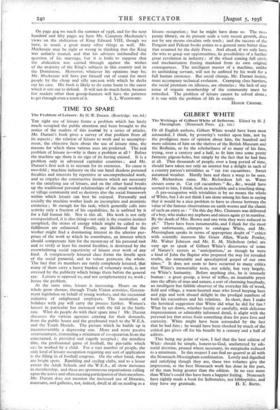TIME TO SPARE
The Problem of Leisure. By H. W. Durant. (Routledge. los. 6d.)
THE right use of leisure forms a problem which has lately much occupied the public attention and been brought to the notice of the readers of this journal by a series of articles. Mr. Durant's book gives a survey of that problem from all its aspects ; the relation of leisure to work and to unemploy- ment, the objective facts about the use of leisure time, the reasons for which these various uses are preferred. The real problem of leisure is—why is there a problem at all ? Before the machine age there is no sign of its having existed. It is a problem only in advanced capitalist countries ; and Mr. Durant's first task is to account for its existence. Its cause is two-fold ; machine industry on the one hand deadens personal faculties and interests by repetitive or uncomprehended work, and so cripples the constructive instincts which are necessary to the satisfying use of leisure, and on the other hand breaks up the traditional personal relationships of the small workshop or village community and so destroys also the social framework within which leisure can best be enjoyed. Personally and socially the machine worker leads an incomplete and atomistic existence ; fit enough for his task, which generally calls into activity only a fraction of his capabilities, he is unfitted by it for a full human life. Nor is this all. His work is not only overspecialised, it is also tiring—not only is the creative instinct atrophied, the stores of energy which might be called to its fulfilment are exhausted. Finally, any likelihood that the worker might find a dominating interest in the ulterior pur- poses of the work to which he contributes, an interest which should compensate him for the monotony of his personal task and so vivify at least his mental faculties, is destroyed by the overwhelming social superiority of leisure over work of any kind. A conspicuously leisured class forms the limelit apex of the social pyramid, and its values permeate the whole. The' fact that its members are rarely completely leisured, that many of them carry a heavy burden of voluntary work, is not stressed by the publicity which brings them before the general eye. Leisure is opposed to, and not complementary to, work ; hence the problem.
At the same time, leisure is increasing. Hours on the whole grow shorter, through Trade Union activities, Govern- ment legislation on behalf of young workers, and the occasional initiative of enlightened employers. The institution of holidays with pay will carry the process further. Women's leisure in particular has increased with the fall in the birth- rate. What do people do with their spare time ? Mr. Durant discusses the various agencies catering for their demands, from the public house and the greyhound track to the W.EA. and the Youth Hostels. The picture which he builds up is incontrovertibly a depressing one. More and more passive entertainment, demanding a minimum of co-operation from the entertained, is provided and eagerly accepted ; the mindless film, the professional game of football, the pin-table which cal be worked by a child. For a vast number of people, the only kind of leisure occupation requiring any sort of application is the filling in of football coupons. On the other hand, there are bright spots. Rambling and cycling clubs, and to a lesser extent the Adult Schools and the W.E.A., all show increases in membership, and these are spontaneous organisations calling upon the active and often exacting participation of their members. Mr. Durant does not mention the increased use of libraries, museums, and galleries, nor, indeed, dwell at all on reading as a
leisure occupation ; but he might have done so. The two- penny library, on its present scale a very recent growth, does not by any means circulate only trash ; and the success of the Penguin and Pelican books points to a general taste better than that assumed by the daily Press. And ahead, if we only have the wits to grasp our opportunities, lie possibilities of a further great revolution in industry ; of the wheel coming full circle and mechanisation freeing mankind from its own original consequences. The intelligent master of a machine, unlike its unthinking servant, will not be unfitted by his work for a full human existence. But social change, Mr. Durant insists, must accompany technical evolution. Cramping class barriers, the social premium on idleness, are obstacles ; the lack of any sense of organic membership of the community must be remedied. The problem of leisure cannot be solved alone ; it is one with the problem of life in society.
HONOR CROOME.


































 Previous page
Previous page